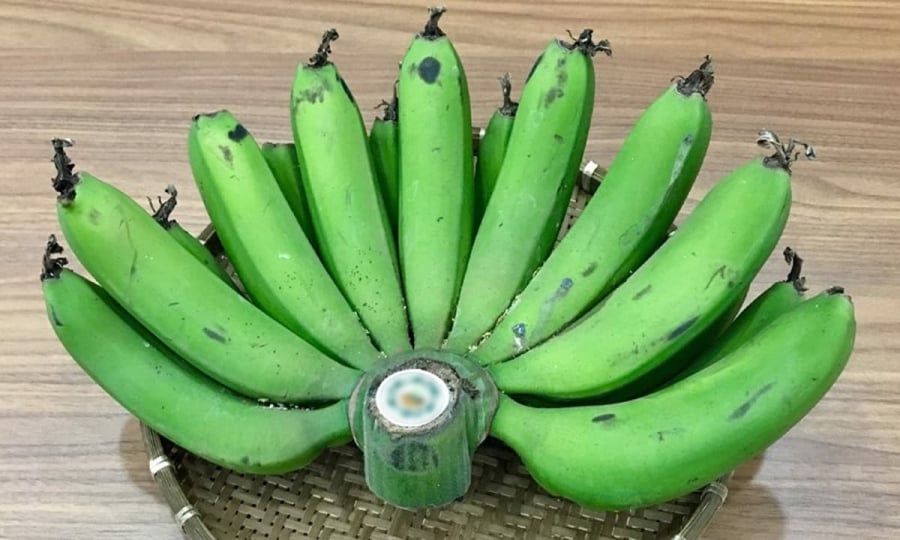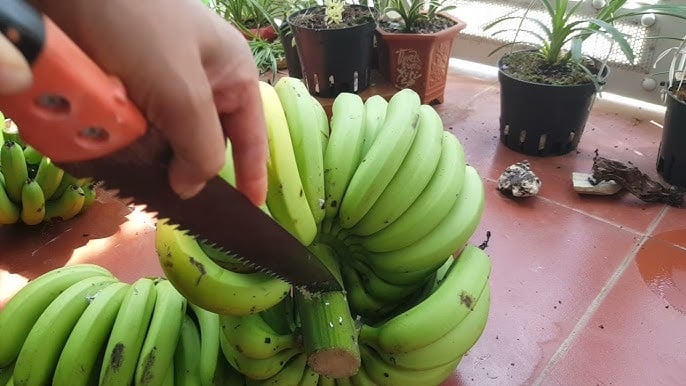Banana has always been considered an indispensable part of the traditional fruit offering in many Asian cultures. In Vietnam, for instance, bananas play a significant role during festive occasions and on the full moon and are often placed in the center of the offering tray, surrounding other types of fruits.

The image of a banana bunch evokes the idea of the Buddha’s hand, symbolizing divine protection and blessing for the family.
Why You Should Not Combine Two Banana Bunches for Offerings
Due to the significance of bananas in these fruit offerings, some people may be tempted to combine two smaller bunches to create a larger and more curved bunch, using wires or strings. However, this practice is generally not recommended according to traditional beliefs.
Combining two banana bunches results in an even number of items, which, according to the yin and yang concept in Eastern philosophy, represents the yin aspect. In contrast, odd numbers are associated with yang, symbolizing movement and development. In rituals and offerings, it is customary to prepare items in odd numbers, such as the number of fruits presented (five types of fruits in the traditional fruit offering, or odd numbers like 3, 5, 7, or 9 if offering only one type of fruit), the number of flowers arranged, or the number of incense sticks burned.
From an aesthetic perspective, combining two banana bunches may make the offering appear more grand, but it sacrifices stability. The structure of the combined bunch is unlikely to stand firmly, increasing the risk of dropping or damaging the other fruits during the ceremony.
In Eastern cultures, it is considered inauspicious for offerings to fall. Additionally, using metal wires or strings to join the fruits together is believed to introduce negative energy, as metal (jin) is believed to counteract wood (mu) in the five elements theory of feng shui.
These beliefs are based on traditional concepts and are not scientifically proven. Therefore, while some people may avoid combining banana bunches, others may still do so if they cannot find a single large enough bunch. Combining two banana bunches requires skill and attention to ensure a harmonious arrangement with other fruits, preventing any imbalance or damage.

Combining two banana bunches often requires the use of wires or nails, which can create negative energy, according to feng shui beliefs.
How to Choose Bananas for Offerings
In Northern Vietnam, the banana bunch represents family reunion and warmth. The upward-facing bananas resemble hands receiving sunshine and dew, resulting in sweet and delicious fruits. This symbolizes good fortune and protection.
When selecting bananas for offerings, it is best to choose green bananas with plump and full fruits. This indicates that the bananas are ripe and have been well-cared for, ensuring a sweet taste. Look for bunches with long and similarly curved bananas. Avoid those with small, stunted, or pale green fruits.
Banana bunches with a large curve can encompass other types of fruits. Additionally, the long and evenly spread bananas resemble the Buddha’s hand, conveying a sense of blessing and protection for the family. Western bananas, with their smaller bunches, are usually offered to the God of Wealth.
It is important to avoid overripe bananas, as they can quickly spoil and fall from the stem, affecting the aesthetic value. Moreover, green bananas represent the wood element in the Five Elements theory, so using ripe, yellow bananas would contradict the intended symbolism.
Ideally, the chosen bananas should have intact stems and fresh, dark whiskers, indicating sufficient nutrition. The stem should be of moderate thickness.
When choosing bananas for offerings, it is also customary to consider the number of fruits in a bunch. Bunches with an odd number of fruits are preferred over those with an even number. In feng shui, odd numbers represent yang, symbolizing life and good fortune, while even numbers are associated with yin. Therefore, banana bunches with 15, 17, 19, or 21 fruits are often more expensive due to their perceived auspiciousness.
By keeping these guidelines in mind, one can select a beautiful and respectful banana bunch for offerings on the first day of the lunar month.
This article is for reference only and is not intended to provide definitive guidance.
The Ancient’s Wisdom: “7 Won’t Bury the Father, 8 Won’t Bury the Mother” – Unraveling the Mystery
“Burying a parent is one of the toughest moments in life, and the old adage, ‘7 won’t bury their father, 8 won’t bury their mother’ is a poignant reminder of the complexities of life and death. This proverb, passed down through generations, holds a deeper meaning that isn’t always readily understood.”





































